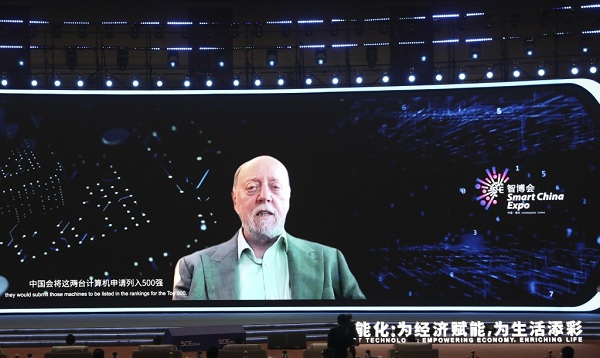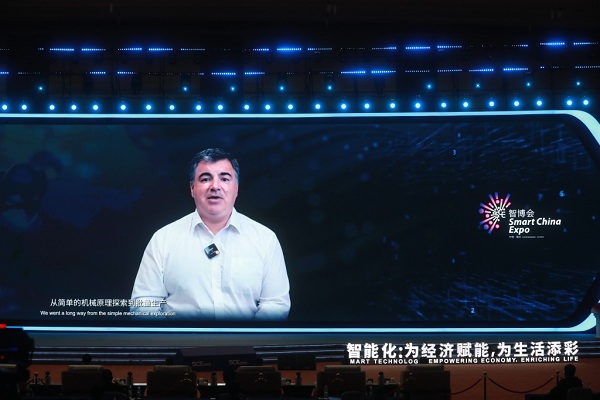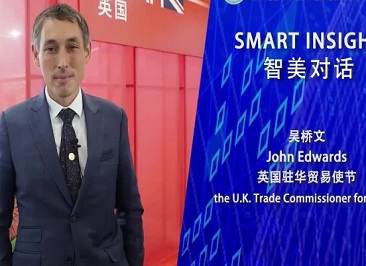Experts speak on Smart China Expo
Zhang Jie
Updated:2022-08-24
chinadaily.com.cn

Jack Dongarra, Turing Award winner, and a professor of computer science in the Electrical Engineering and Computer Science Department of the University of Tennessee. [Photo provided to chinadaily.com.cn]
A summit bringing together Nobel Prize winners, Turing Award winners, Chinese experts, academics and entrepreneurs was held during the Smart China Expo 2022 on Monday. Let's take a look at their opinions.
Jack Dongarra, Turing Award winner, and a professor of computer science in the Electrical Engineering and Computer Science Department of the University of Tennessee
China is the biggest consumer of the supercomputer, and also the largest supercomputer manufacturing country, having 173 supercomputers in operation currently.
In the future, these high-performance computers will be customized. The computer, consisting of other accelerators will emerge and will be used in machine learning, quantum computing, and optical computing. These possible scenarios will help design future systems.
Mei Hong, a member of Chinese Academy of Sciences
The era of digital economy has been opened, and digital transformation has become an inevitable choice for human society's development.
The ability of data development and application has become a key indicator to comprehensive competitiveness for countries, regions and organizations.
Lu Yong, senior vice-president of Huawei
As a witness to China's smart city development, Huawei believes that in the near future, AI will be as popular in cities as electricity, and the power of AI will be felt in every corner. Huawei will join hands with Chongqing to deepen the building of a smart city.

Konstantin Novoselov, a 2010 Nobel Prize winner. [Photo provided to chinadaily.com.cn]
Konstantin Novoselov, a 2010 Nobel Prize winner
The functional material will be intelligent in the future, which means it will have memory, and can be taught to realize specific functions.
Zhang Chunhui, vice-president of Alibaba Group, and co-CEO of Banma Network
The connected vehicle service provider Banma Network will corporate with Chongqing to build an industry that features automotive operating systems.
Chongqing has complex road networks with many mountains, bridges, highway interchanges and tunnels, which is a challenge to the infrastructure of smart vehicles and smart cities. Therefore, building a smart city in Chongqing needs a collaborative operating system which integrates vehicles, roads and technology to provide a powerful, intelligent data engine.
Wang Shuxin, an academician at the Chinese Academy of Engineering, President of Chongqing University
Intelligent remote surgery has become an important development in recent medical technology and the medical industry, and also is a new technical way to solve the unbalanced medical resources problem.
The combination of 5G technology and robotics also provides a new technical feasibility for the treatment of diseases, and new solutions to balance the medical resources.
Zhu Huarong, chairman of Chang'an Automobile
Development of smart vehicles can not only satisfy people's intelligent travel and convenient transportation, but also provide an opportunity for Chinese car brands to realize lane changing and overtaking.
Li Keqiang, an academician at the Chinese Academy of Engineering, and a professor of Tsinghua University
Building intelligent automobile technology ecosystems with vehicles, roads, clouds and networks, is a key task to develop the Chinese automobile industry.
Smart vehicles are not simple superpositions of intelligent, network technology and automobile technology, but are a new product structure produced by the integration of key elements in the industry field.
Liu Liehong, chairman of China Unicom
5G technologies can adapt to a variety of industrial protocols and realize extremely low latency communication. Through integration and innovation with edge cloud and industrial control systems, 5G technology will bring a way to break difficulties and blocking points to the industrial internet.
Once we integrate 5G technology with industrial Internet it will become a new toolbox to promote industrial transformation and upgrading.
Video

John Edwards, the UK trade commissioner for China, praised Chongqing over its rise as a burgeoning center in intelligent manufacturing.





